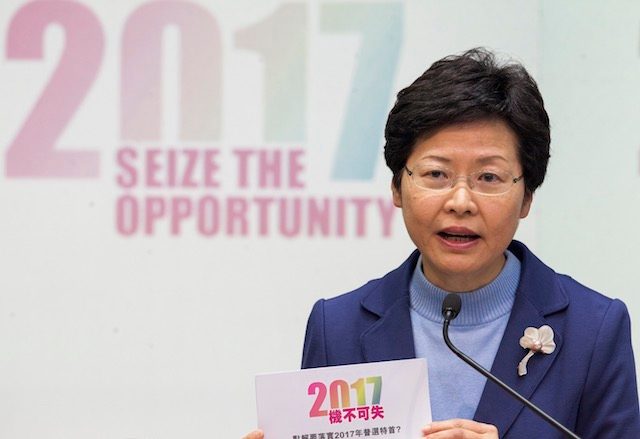SUMMARY
This is AI generated summarization, which may have errors. For context, always refer to the full article.

HONG KONG (2nd UPDATE) – Hong Kong’s government Wednesday, April 22, announced a roadmap for leadership elections that offered no concessions to the city’s democracy camp – prompting a backlash from opposition lawmakers and warnings of more street protests.
Deputy leader Carrie Lam said the first-ever public vote for the post of chief executive in 2017 would be held in “strict compliance” with a ruling by China’s National People’s Congress last August.
That ruling stated that candidates for chief executive must first be approved by a loyalist committee, a decision that sparked more than two months of mass rallies which paralyzed the city towards the end of last year.
Activists branded Beijing’s framework – universal suffrage based on pre-selected candidates – as “fake democracy”.
Analysts warned that protesters would likely mobilize once more if the bill is passed in the coming months.
Student leaders have already mooted the idea of an “Occupy Legco” movement to take over the legislature if the bill goes through.
“We are totally disappointed with the political reform package,” said Joshua Wong, the teenage face of the protest movement.
He added that it was the “responsibility of the young generation” to oppose elections which stuck to Beijing’s restrictions.
The small number of tents that have remained on a road next to the government headquarters since the end of last year’s protests have swelled in recent weeks.
Lam said that voters in 2017 would choose from two to three candidates selected by a 1,200-strong nominating committee.
That committee would reflect the current make-up of the pro-Beijing election committee, which up until now has chosen the city’s leader, she said.
“These proposals are in strict compliance with the Basic Law (Hong Kong’s constitution) and the relevant decisions of (China’s) Standing Committee of the National People’s Congress,” Lam said.
“At the same time they fully take into account the views expressed by various sectors of the community,” she added.
“It is neither practicable nor realistic to expect that one package of proposals can meet the ideals cherished by different people,” she said.
Lam urged lawmakers to cooperate on passing the bill but most pro-democracy legislators marched out of the chamber following her speech.
“The pan-democrats would like to condemn strongly the government,” said Civic Party lawmaker Alan Leong, one of those who walked out.
“We will launch a campaign to oppose the proposal and we will ask the Hong Kong public to continue to seek true universal suffrage,” he added.
Threat of protest
“(The package) is very draconian, very harsh, very austere and shows no room for compromise,” political analyst Willy Lam told Agence France-Presse, saying that it was an extension of the hard line of China’s President Xi Jinping.
“This reflects Xi Jinping’s much more conservative line, not just on Hong Kong but in Taiwan and Tibet,” Lam said, saying that Hong Kong was “taking orders from Beijing”.
He expressed surprise at the lack of movement on the composition of the nominating committee, which commentators had suggested could be made more representative of the general public.
“It is a certainty that no democratic candidate can become a (final) candidate,” said Lam.
Candidates can enter the first round of the leadership race with the backing of 120 members of the nominating committee. But they then need 50 percent support from the committee to move forward to the public vote.
“If the government succeeds in passing the bill then it’s quite possible there may be a few thousand protesters surrounding the legislative council building,” said Lam.
Another political analyst Sonny Lo also warned of the “realistic possibility of confrontation”.
“If the bill is passed, the ‘Occupy Legco’ movement would likely persist for some time,” he said.
Hundreds of angry pro-government and pro-democracy protesters faced off outside the government complex Wednesday.
Dozens of police were patrolling the area, an Agence France-Presse reporter at the scene said.
A police spokesman refused to comment on whether extra security measures were being taken in the wake of the announcement.
The legislature said they will step up security at government headquarters from May 1 after protesters smashed windows there twice last year and stormed the building.
Measures include extra security checks, roller shutters and metal barricades. – Aaron Tam and Laura Mannering, AFP / Rappler.com
Add a comment
How does this make you feel?
There are no comments yet. Add your comment to start the conversation.